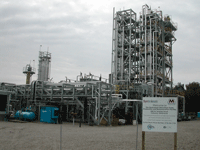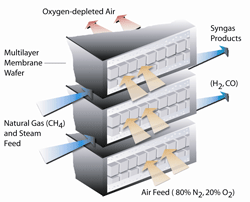|
Petroleum fuels make up the vast majority of energy consumed in the U.S. transportation sector. According to the Energy Information Administration's Annual Energy Outlook 2006, the United States consumed over 15 million barrels per day of petroleum products in 2004, and consumption is expected to increase to nearly 26.1 million barrels per day by 2025. Additionally, U.S. refineries have been operating at full capacity in recent years to meet current U.S. demand.
The DOE's Office of Fossil Energy is focused on enhancing the production of a diverse, secure domestic supply of fuels. Efforts include supporting targeted technology development and demonstration projects to further the use of innovative technologies that will lead to reduced environmental impact and enable the development of fuels from unconventional resources, and performing analysis to identify key industry challenges and technology and policy options for ensuring adequate supplies of clean fuels for American consumers.
Ultra Clean Fuels
A significant amount of the world's natural gas resources are considered "stranded." The DOE's Office of Fossil Energy supports the development of technologies that can economically convert these resources into high-quality, ultra-low sulfur fuels that can be transported to consumers or used in remote locations. In 2001, DOE agreed to fund 50 percent of a $26 million project with ConocoPhillips and its partners to perform comprehensive life-cycle systems analysis and techno-economic comparisons of producing ultra clean fuels from stranded natural gas.
The life-cycle results will be compared to existing fuels such as gasoline and diesel as well as to emerging fuels, such as biodiesel, ethanol, compressed natural gas, liquefied natural gas, and electric vehicles to determine the advantages and disadvantages in costs, emissions, and performance of each option. Preliminary results of the project indicate that these ultra clean fuels have lower emissions of pollutants and greenhouse gases compared to gasoline and diesel fuel.
A first-of-its-kind, DOE-joint industry partnership project which began in 2001 entails a natural gas-to-liquids demonstration facility to produce high-performance, sulfur-free fuel. DOE provided about $18 million of the $38 million total cost of the demonstration plant. The plant, built near Tulsa, Oklahoma, was dedicated in October 2003 and was designed to produce approximately 70 barrels of ultra clean fuel per day from natural gas.
|
 |
| |
Syntroleum ultra clean fuels demonstration facility in Oklahoma. |
|
|
The facility was built under a cooperative agreement involving DOE, Syntroleum Corporation, Marathon Oil Company and Integrated Concepts Research Corporation. It utilizes the proprietary Syntroleum Process to convert natural gas to ultra clean fuel. The facility consists of three primary components: an autothermal reformer that converts the natural gas into synthesis gas, a mixture of carbon monoxide and hydrogen; a Fischer-Tropsch unit that produces synthetic crude oil from the synthesis gas; and a refining unit that upgrades the synthetic crude to ultra clean fuels. These fuels, which can use existing delivery infrastructure, are being tested in bus fleets operated by the Washington, DC, Metropolitan Area Transit Authority and the National Park Service in Denali, Alaska.
The demonstration of this small-scale plant will help determine the feasibility of producing ultra clean fuels in remote locations.
For example, these plants may have applications in remote areas of the world, such as rural Alaska, where stranded natural gas resources exist, or for military applications to allow fuel production closer to the location of use.
Advanced Syngas Production
DOE's Office of Fossil Energy is also working with various industry partners to develop innovative membrane reactors that produce synthesis gas. These membrane reactors may also potentially produce hydrogen and allow for the efficient management of carbon dioxide.
|
|
 |
Schematic of innovative membrane reactor technology to produce synthesis gas from natural gas.
| |
DOE has partnered with Air Products and Chemicals, Inc., to develop Ion Transport Membrane (ITM) technology for the production of synthesis gas from natural gas. These innovative membranes are ceramic membranes that are fabricated from non-porous, multi-component metal oxides.
The ITM technology combines the two steps of autothermal reforming - air separation and natural gas reforming - into one step. Natural gas and steam enter on one side of the membrane and air enters on the other. Oxygen from the air passes through the membrane and reacts with the natural gas and steam mixture on the other side to produce synthesis gas. By combining two steps into one, the process can potentially reduce the capital cost by 30% compared to conventional autothermal reforming. The synthesis gas can subsequently be used to produce either a variety of liquid fuels and chemicals, or hydrogen which can be separated for eventual use in fuel cells. The project team is diverse including three universities, two national laboratories, and six other private sector energy firms.
Begun in 1997, the project is currently in the second of three phases. A laboratory-scale, 24 thousand standard cubic feet per day process development unit (PDU) has been constructed for membrane and component testing and evaluation. Materials, catalysts and membrane seals have been developed and evaluated and have shown promising results. The project team is currently refining the ITM process design and evaluating the economics of operation at a commercial plant-scale.
DOE's Office of Fossil Energy is also working with small businesses on developing novel technologies that can produce synthesis gas from natural gas. Through the Department's SBIR/STTR (Small Business Innovative Research/Small Business Technology Transfer) program, seven projects in Phase I, each with a value of $100,000, are developing technologies that produce synthesis gas from natural gas, with an emphasis on hydrogen production. Two additional projects are in Phase II but emphasize the production of ultra clean fuels. The seven projects emphasizing hydrogen production are investigating:
- Novel reforming catalysts.
- Nano-catalysts.
- Simplified reactor designs.
- Short contact time reactors.
- Separation technology that produces both a pure stream of hydrogen and carbon dioxide.
- Technology that can eliminate the need for expensive equipment.
- A process called "thermal decomposition" which produces ydrogen from natural gas without co-producing carbon monoxide or carbon dioxide.
The SBIR/STTR program within the federal government has been established to provide funding to small businesses to stimulate small business technology innovation to meet the federal government's research and development needs. A study prior to the formation of the program showed that small businesses had two and a half times as many innovations per employee compared to larger companies but were less likely to receive government assistance. Involvement in this program allows the Office of Fossil Energy to tap into the innovative research at small businesses to support its R&D efforts while allowing the small business to promote, develop, and commercialize its technology.
Analysis
DOE's Office of Fossil Energy also performs and supports analyses on various fuels production and delivery issues. Efforts include assisting industry in identifying and addressing the challenges associated with producing and delivering fuels that meet new product specifications, such as Environmental Protection Agency (EPA) Tier 2 gasoline and diesel fuel sulfur specifications and "boutique fuels." A boutique fuel is a specific clean fuel mandated to meet local air quality requirements under the Clean Air Act. DOE also works with other federal agencies such as EPA to ensure that new regulations are based on sound scientific, technical and economic data.
Most recently, the Office cooperated with the National Petroleum Council (NPC) to produce the report Observations on Petroleum Product Supply that was released in December 2004. The NPC is a federally chartered and privately funded advisory committee to the Secretary of Energy and consists of representatives from a broad cross-section of the oil and natural gas industries and related interests. The purpose of the group is to advise, inform, and make recommendations to the Secretary of Energy on any matter requested by the Secretary related to oil and natural gas or these respective industries. In the report, the NPC made observations on petroleum product supply and market dynamics, provided an overview of inter-related refining and product inventory analyses, and made recommendations to the Secretary.
|